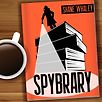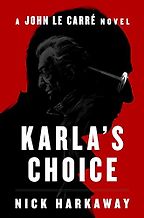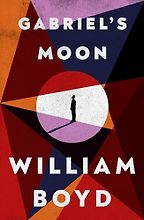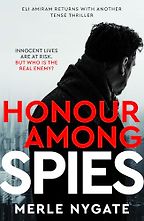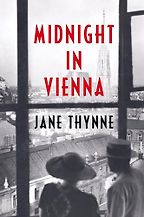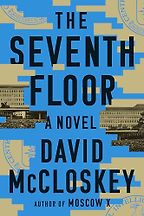We’re talking about your choice of the best spy novels of 2024. ‘Best’ is of course subjective so, before we turn to the books, can you give us a sense of what kind of spy novel you like and what you’re looking for in a really good spy read?
I like my spy books to be gritty and realistic. I like my spies to face moral dilemmas—because that’s very often what happens to spies. I’m not into techno-thrillers—what we jokingly and sometimes affectionately call the Kalashnikov kids, which are basically Rambo-style books masquerading as spy thrillers. I grew out of those by the time I was 25.
You have the hot war stuff—the military thriller action heroes—and then the more cerebral stories such as Tinker Tailor Soldier where the reader is trying to work out who is the mole. Personally, I am a ‘Cold Warrior,’ though I have picked books here which are set in different eras. Those who enjoy the more realistic side of the spy book aisle will enjoy my choices. Yes, there is action and there are some gun fights, but these books are not shoot ‘em ups.
Last year (2023) there were a lot of books you were enthusiastic about. I’ve read them too, so now I’m a fan as well. How does this year compare? Are we at a stage where there are just a lot of really good spy novels coming out?
Absolutely. It was a challenge deciding which books to choose. There are so many great authors out there, it was really difficult to pick just five. What I did was ask for help. At Spybrary, we have a very engaged community of spy book lovers and I asked them for their favourite books of the year. I then went and read their recommendations and two of those books did actually make it onto my list. So there are some surprises in here.
Let’s turn to the books. First up is Karla’s Choice by Nick Harkaway. Nick Harkaway is, I believe, John le Carré’s son and this book features his father’s most famous spy, George Smiley. Is that right?
Yes, it is. Let me be honest with you, when it first became public that Nick Harkaway was writing a George Smiley novel, I was very apprehensive. For me, the two most famous fictional spies in the world are James Bond and George Smiley. But I try to be open minded. I wondered, ‘If this is like the new Star Wars movies, is it going to be the dreadful Phantom Menace or is it going to be the brilliant Rogue One?’ And I’m pleased to say it’s more Rogue One than Phantom Menace.
I was absolutely blown away with how well Harkaway has written this book. It smells like the Circus. He brings a lot of characters back and reintroduces us to them. Where he was very clever was that instead of writing a brand-new George Smiley novel—like a lot of the James Bond or Tom Clancy continuation novels, which are set in the modern day—he identified that there was a nine year gap between The Spy Who Came in from the Cold and Tinker Tailor Soldier Spy. He’s cleverly positioned his book within that timeline, so he’s able to refer back to the events of The Spy Who Came in from the Cold.
What’s really good about Karla’s Choice is you can read it as a standalone novel. So if you’ve never read any Smiley novels or le Carré you can pick it up. I think the intention was—and what I hope happens is—that you then go, ‘Oh, this is great. Now I want to read The Spy Who Came in from the Cold and the whole Smiley series.
In terms of the language, it’s not pastiche. Harkaway has got his own style. But he did say in an interview that when he was a little boy—he was born in 1972—le Carré didn’t type and would dictate his novels to his wife over the breakfast table in the morning. So Harkaway acquired the world of Smiley when he was acquiring language and he didn’t have to move the dial too far. The other books that he has written are very different genres: this is the first time he’s written an espionage novel.
But my God, it’s incredible. He really has kept that style of his father’s. Just meeting again the characters from the Circus—Toby Esterhase, Peter Guillam, Control, as well as new characters that he’s brought in. It’s a real revelation. This is the book of the year for me, he’s knocked it out of the park. So much so that I wrote him saying, ‘You’d better be writing more of these!’.
Harkaway says that his father’s intention was always to write more Smiley novels than he did. The challenge was that because Alec Guinness played such a great George Smiley, le Carré always had Guinness in his head. That prevented him from writing more Smiley.
In terms of the plot, Karla’s Choice is set in 1963 London so presumably it’s a Cold War story? Tell me a bit about what’s going on in the book.
Karla is Smiley’s old adversary, he is the head of the Thirteenth Directorate of Moscow Centre. Karla features in Tinker Tailor and the other Smiley books, but not in The Spy Who Came in from the Cold. Again, Harkaway has been clever here. It’s a bit like Jaws: you don’t see the shark very often. It’s the same with Karla: he’s used very sparingly. The book opens with a Soviet hood turning up to assassinate a Hungarian émigré in London, Bánáti. On the doorstep of the office, which is opened by Bánáti’s assistant, Susanna Gero, the assassin has a change of heart. He says God has told him not to kill Bánáti. When I first read this scene, I thought, ‘Really?’, but le Carré shared quite a few stories with young Nick about the secret world, and this actually happened. Spy fact is often stranger than spy fiction.
The first half of the book is George Smiley interviewing people. He’s brought back into the service having left after the events of The Spy Who Came in from the Cold. I don’t want to reveal what happened for those who haven’t read that book, but it has a pretty jarring, emotional ending. Smiley has had enough and doesn’t want to be part of it but Control brings him back in, saying ‘I need you for this. What are the Soviets doing sending in assassins to London to kill this guy? Who was he? We need to know.’ And the plot unfolds from there.
George Smiley is like Sherlock Holmes rather than James Bond. He’s not going out there and shooting people, bedding women and drinking too much alcohol. He is sitting down with a cup of tea and talking to people, and that’s how everything unravels. You asked me what I love in a spy novel, and this is it: the good spy novelists keep us guessing throughout the book. We’re trying to find out who it is or what it is before the author tells us. There are clues that are dropped, but also red herrings.
In the second half of the book, they have an idea of what’s going on, and go on the hunt for Bánáti. You see George Smiley in some action sequences. He goes to Vienna, he goes to Berlin. You’ve got Hans-Dieter Mundt from The Spy Who Came in from the Cold and also appears in Call for the Dead, the very first Smiley novel.
What I love about Karla’s Choice is that you get the history of Mitteleuropa or Central Europe. There’s a lot in this book about Hungary. In 1963 most people would have been aware of what happened in 1956 in Budapest. Today, not so much. Harkaway did a lot of research and was able to tell the history of Hungary without it being a history textbook. I thought that backdrop was very clever. Hungary was part of the Austro-Hungarian empire, then there was World War Two and the Soviets coming in as ‘liberators’, and then there was the Revolution. It’s a heady history.
You’ll notice in some of my picks later on that food is very important to me in the books I read. They talk about Hungarian food in the book and the best compliment I can give Harkaway is that on finishing the book I went and bought some really good paprika and made a goulash.
So the first half of Karla’s Choice is more mystery or detective book and the second is the pursuit and of course the reveal.
How many Smiley books are there in total?
I believe there are nine. Again, it’s the shark thing: in some of them he features very little. Smiley doesn’t come into The Spy Who Came in from the Cold till the very end, and it’s a fleeting appearance. But you find out more about that in this book. That’s where Harkaway has been very clever.
Let’s go on to the next book you’ve chosen, Gabriel’s Moon by William Boyd, which is partly set in the Congo in the 1960s.
The book opens in 1936, and you’ve got young Gabriel being tucked into his bed by his mum. He has a lamp in the shape of a moon. There’s such an economy of language: within about 20 pages you find out his backstory. He wakes up struggling to breathe. There’s smoke and the house is on fire. His mother is dead. He manages to escape and is adopted by his uncle.
That start affects him for the rest of his life. His bedside lamp is blamed for the fire and the death of his mother. He has chronic insomnia—he can’t sleep. He goes to a therapist, which is quite an important part of this book. Again, it’s difficult with these thriller books because you can’t go down Spoiler Strasse, but there are things that unfold about what happened when he was just six years old.
He becomes a travel writer and he’s in Congo. He’s not a political journalist, but he gets the opportunity to interview the then president, Patrice Lumumba. And as we all know, Lumumba dies in very suspicious circumstances, with the fingers very much pointed at the West. Gabriel has tapes of the interview, in which Lumumba says, ‘These three people are out to get me.’ So you can imagine how sought after these tapes are.
Gabriel’s Moon was one of the suggestions from the Spybrary community for book of the year. I must confess I hadn’t read any William Boyd previously. Restless is the one everyone talks about, and also Any Human Heart. Boyd also wrote a Bond book, Solo, which I have on my shelves, but just not got round to.
I was reminded very much of Eric Ambler. Ambler’s books are very much about the accidental spy and not someone who was trained as one. It’s someone who finds himself in a situation. Gabriel is flying back from Congo and he sees a woman reading his book on the flight. He thinks, ‘How cute! Someone is reading my book. Should I tell her?’ But he decides, ‘No, I won’t.’ She becomes involved in his life. He ends up running errands and messages for her. He’s sent to Spain to a man called Blanco. Gabriel is ‘the useful idiot’ or is he?
There’s a lot of humor in the book and I’m sure William Boyd had a good giggle writing it. One of the characters teases Gabriel about his travel writing, the purple prose, and gives examples of his flowery language, which I thought was a lot of fun.
Gabriel does drink a lot. I asked a good friend of mine who read the book what they thought of it. They said, ‘I didn’t like it because I didn’t like the protagonist.’ I said, ‘How can you not like Gabriel?’ and they replied, ‘He’s a sex maniac, he’s an alcoholic and he’s a stalker’. I said, ‘James Bond possesses at least two of those three characteristics, but you like him!’ For me, it wasn’t off-putting. He definitely has his sex drive, but we’re not talking Gregg Wallace here.
Gabriel has an older brother who works for the Foreign Office, who has a big house in Highgate and lots of money. He goes there for Sunday roasts, and it’s a real contrast in their two lives.
I love how this book weaves fact and fiction. You have the Lumumba plot as well as other real-life events that crop up. I love it when writers do that and Boyd does it really well. Boyd is a master storyteller. I’m not sure if this book would have worked so well with a less experienced writer, but the book really does work for me.
I love the fact that it’s set in Congo. That’s what I love about spy novels—finding out about Hungary or the Congo and what was going on there. That history is just a great setting for a story.
Yes, and the mystery. There are twists in the book. Who is this woman? We’re trying to outwit the author to find out what’s happening first.
Gabriel’s Moon is a profound exploration of the effect of espionage on the individual. I call Gabriel accidental, but he’s not hapless. He makes decisions and does a few things in the book that have serious consequences.
We’re now at the third book on your list, Honour Among Spies by Merle Nygate. This novel is set in the present, although before October 7 and the Hamas attacks on Israel. The chief protagonist works for Mossad, the Israeli intelligence agency, in London.
Yes, that’s right. So at the very beginning of the book, there is an author’s note where she says that it was written prior to the horrible events of October 2023. In an interview, she said she actually submitted her manuscript on October 5th. The world is so fast moving right now, you have to feel for these spy writers.
Honour Among Spies revolves around the station chief for Mossad in London, Eli. It’s the second book she’s written about him, but it can be read as a standalone. Nygate says she had read The Little Drummer Girl and, much as she’s a fan of John le Carré, she didn’t feel he writes women very well, which is true. She also felt that he didn’t write Jews very well, so she wanted to have a stab at rectifying that.
She absolutely insists she’s not a Mossad agent. Of course she’s going to say no, but the reason I asked her is because the book feels like she’s had experience of working as a spy. It feels authentic.
Like the Len Deighton novels, it’s not just the global espionage, you also have office politics. In the Deighton books, it’s about class. It’s the upper classes versus Bernard Samson, who is working class. In Honour Among Spies, you have the more fundamentalist right-wing Israelis, and the more liberal Israelis, of which our main character is one. Eli believes in Israel and puts his life on the line, but he’s not an extremist and has to navigate the office politics to get the job done.
The central plot is skullduggery. Eli is trying to doctor Russian drones so that they backfire. There’s a lot of following arms dealers and hoods. He puts his marriage on the line. Eli is an expert agent handler, and he runs his wife like an agent. His wife is a therapist, who is working with the relative of someone he wants the goods on. So Eli does the one thing you should never do in a relationship: he gets on her computer and raids her files. That’s the moral dilemma: I have to do this for world peace, even though I might lose my marriage.
Petra is the female heroine of the book; she’s been a spy and is now a private contractor. She’s in a relationship with a man who doesn’t know her background and that has repercussions on that relationship as well.
So you have the spy story, you have the personal decisions, and you also have really good tradecraft in the book. Nygate uses a term ‘vinyl tradecraft,’ which I really like. It’s tradecraft that can’t be detected electronically. It could be someone on a bus who holds up a Post-it note with the meeting place destination scrawled on it. Mossad do have a tech van, the gadgets and the toys, but there’s much old school tradecraft for us traditionalists.
I love the realism of these books. And whereas I went and cooked a goulash when I read Karla’s Choice, on reading Honour Among Spies, I had to go and find some really good hummus. There is one particular scene where they’re in a van doing a stake out. It’s winter and it’s freezing cold. Petra always brings a packed lunch with her, which is really practical: you don’t know how long you’re going to be sitting in a van or on a park bench. And they start talking about someone’s hummus back in Israel. And I’m like, ‘I want some good hummus now!’
You don’t see much of that in shoot ’em up spy books: they’re too busy polishing their guns and counting their bullets. Whereas our heroes are talking about hummus. It just feels real.
Are there many books about Mossad?
Not a huge number. Merle cites the nonfiction book Gideon’s Spies for her research. She says that’s one of the best books on Mossad. There’s also a couple of other ones that have come out since. It’s a fascinating history. When you look at their raison d’etre, what they are all about, what they are trying to preserve, and by any means necessary…
Let’s go back in time now to Midnight in Vienna by Jane Thynne. This is set in London and Vienna before World War Two. Tell me why you picked this one.
I’m not usually a reader of historical fiction. There are too many nonfiction history books that I would prefer to read. Midnight in Vienna is the exception. It was a suggestion from the Spybrary community and I thought. ‘Okay, let’s give it a go.’
It’s 1938, the eve of war, and I think there are parallels with where we are today. You have Neville Chamberlain going to Munich and other places, trying to appease Hitler. Memories of World War I were still too stark and much of the country was thinking, ‘We can’t face another war. The politicians will figure it out.’ Then you had Churchill saying, ‘We’re sleepwalking into this. We need to rearm and get ready. Hitler is totally fixated on going to war.’
That comes across in the book. You can just feel the mood in 1938 London. No one’s really sure how things are going to pan out. That was very clever. You can tell that Jane has conducted a huge amount of research in conveying that atmosphere.
The plot revolves around a detective writer Hubert Newman, who dies suddenly. That’s the backstory, the intriguing piece of this book. Was it a natural death? Or was there something dodgy about it? Newman was a cozy detective novelist who is less cozy than he seems.
The two main characters in the book are Stella Fox and Harry Fry, who are very different from each other. Stella has been out in Vienna working as a tutor to a Jewish family. They’re realists and can see the writing on the wall and flee to the US. So Stella comes back to London and gets a job for Newman typing up his book. When he dies the very next day, she’s obviously shocked. And then this big package arrives, which is the manuscript. It is dedicated to her, Stella, ‘spotter of mistakes.’ It’s a book about who Shakespeare really was. But there are clues in it, revealing a modern day threat to national security that Stella picks up on and then investigates.
Harry is a former MI5, Special Branch gumshoe. He’s been kicked out under a cloud for reasons that are revealed later on. Again, Jane weaves in fact with fiction. So you start off with Harry tailing George Orwell because he’s on a list of dodgy lefties, creative types that they were following. Harry also follows Wallace Simpson. At one point he visits Dorothy L. Sayers, the famous mystery writer, because Hubert Newman was a member of her Detection Club. I won’t spoil it for your readers, but that scene really made me giggle. It’s very cleverly done.
There’s a class divide. Stella is middle/upper class—she’s staying with a friend who’s a socialite. Harry is working class. That’s how it was between MI5 and MI6. MI5 were in the main recruited from the working classes, whereas MI6 recruited the elite set such as Maclean, Blunt, Philby et al. Stella and Harry wouldn’t normally get on or mix in the same social circles, but they join forces to find out what’s really going on.
Stella goes out to Vienna at one point to conduct the investigation. Again, Jane has done a tremendous amount of research on Vienna in the late 30s, and what it was like to live there under the heel of the Nazis.
I was really enthralled with this book, because I couldn’t quite see where it was going.
Let’s move on to your last book. It’s by David McCloskey, who was also on your list last year. His latest book is The Seventh Floor. Is it his best one so far?
It’s different from the others. As David makes clear in the author’s note, Seventh Floor is very much a hat tip to le Carré’s Tinker Tailor Soldier Spy. It’s not a rip-off of Tinker Tailor—it’s an American story, but it also revolves around a mole hunt.
It starts in Singapore where it all goes wrong for Sam Joseph, the CIA agent from McCloskey’s first book, Damascus Station. He goes to meet a Russian contact at a casino, is rumbled and gets captured.
Artemis Procter, a no-nonsense spy, has been the one constant character in McCloskey’s books. She gets kicked out of the CIA, and becomes the operations director of Gatorville, an alligator farm in Florida. She’s such an interesting character. She’s obviously been around the block. She’s bruised, she’s battered. She takes no crap from anyone, and then she’s wrestling alligators.
She’s brought back to find out who the mole is within the CIA. It’s one of half-a-dozen people, and you get to know them. They all grew up together. They trained together at the Farm. McCloskey keeps you guessing.
Just as in Tinker Tailor, just like with Philby, this is true betrayal—of not just the country but of true friends. McCloskey is able to build up the friendship side so convincingly that I felt as if I had been betrayed by a close friend. It’s not just five random characters, so when you get that reveal at the end you can really see the toll it has taken. When you’re questioning your friends, when you know one of them has betrayed you, where does loyalty come in? How do you be objective?
This book is faster paced than my other suggestions, but it’s not a shoot ‘em up. Yes, there’s action in it. There’s violence. There are also—in a nod to that great TV show, The Americans—two sleeper Russian assassins living in Texas who get called on to kill Artemis Procter. They have been living in the US a long time and no one suspects them. Just as I.S. Berry, in The Peacock and the Sparrow, is very good at describing the expat scene at embassies, through these two assassins we see what life is like in suburban Dallas, going to people’s houses for barbecues. It’s all false and all the while they’re loyal agents to Mother Russia.
Is it mainly set at CIA headquarters, or around the world?
‘The seventh floor’ of the title is where the bosses of the CIA sit in Langley, Virginia. You do get some scenes there, but you also get Artemis Procter and her sidekick, Sam Joseph, going to different cities and countries. There’s the stuffiness of CIA headquarters and then you have all the debauchery when they go off to interview a Russian defector with lots of money who is living in Las Vegas. You definitely get a bit of globe-trotting.
There’s also tradecraft in it. That’s true of all my choices. Yes, we want to guess where the plot is going and unravel the mystery for ourselves, but we all love a bit of good, believable tradecraft in our spy books.
Listen to the Spybrary podcast or join the Spybrary community on Facebook
Interview by Sophie Roell, Editor
December 15, 2024. Updated: March 18, 2025
Five Books aims to keep its book recommendations and interviews up to date. If you are the interviewee and would like to update your choice of books (or even just what you say about them) please email us at [email protected]
Five Books interviews are expensive to produce. If you've enjoyed this interview, please support us by donating a small amount.

